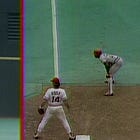This is Throwbacks, a newsletter by me, Michael Weinreb, about sports, history, culture and politics, and everything in-between. Welcome to all new readers/subscribers, and if you like what you’re reading, please join the mailing list and share, on social media or through e-mail or however you feel comfortable sharing. (It’s still FREE to join the list: Just click “None” on the “subscribe now” page.) The best way you can help out is by spreading the word and sharing with others. I have set up payment tiers, if you wish to chip in and allow me the time to do a little more research on on these posts. You’ll get full access to the archive of more than 100 previous posts, as well.
I.
Forgive me while I bore you with numbers, but let’s get through this quickly together:
In 1967, the National Basketball Association made an utterly arbitrary decision based on utterly arbitrary math. That year, the league added franchises in Seattle and San Diego and expanded to 12 teams. In order to have each team in a respective division play each other eight times a year, and play each team in the other division seven times a year, the NBA expanded its season from 81 to 82 games. And even as the league has more than doubled in size—and even as the popularity of the league has skyrocketed—that number has remained the same ever since.
There are things in sports that we’ve come to accept merely because that’s the way they’ve been for a generation. A basketball season is 82 games long; a baseball season is 162 games long. We don’t ask why; we just accept that this is the way it will probably always be, unless, like the NFL, you somehow manage to sneak in another week of games in order to further brutalize your talent pool.
Years ago, I wrote a story that asked a simple question: Why are we so enamored by the seven-game postseason series? And the answer was even less scientific and more superstitious than I could have imagined. People just make this shit up, and it sticks, because sports is governed far more by tradition than by common sense.
The reason I bring this up now is because the NBA, thanks to an unscientific decision made fifty-six years ago, is now completely screwed. Its regular season is far too long, and everyone knows the regular season far too long, but no one in power wants to reduce the length of the regular season because taking away games would mean wresting away money from millionaires and billionaires, and this is simply not the American way.
And so the only option was to attempt to impose some sort of additional meaning upon the regular season. Which has led to perhaps the most confusing innovation in modern sports history.
II.
Here is my attempt to explain the NBA’s new in-season tournament—which is actually just called “The In-Season Tournament,” which affords it all the sexiness of a pair of Haggar slacks. I am putting this together without resorting to a Google search, based primarily upon text messages with friends who follow the NBA far more closely than I do, but who also have no idea what the hell is going on.
A.) The 30 NBA teams are divided into five groups of six teams each. These groups were determined based either on random lottery, or a complex formula that tabulates Klout scores and divides them by Woj Bombs.
B.) Tournament games are held on Tuesdays and Fridays, unless that Tuesday happens to be an Election Day or unless that Friday happens to be particularly freaky. This will continue until the group play is complete or until James Harden requests a trade.
C.) The easiest way to tell if it’s an in-season tournament game is if the court looks like the cover of a Journey album.
D.) Despite there being six groups of teams, eight teams will make the semifinals of the tournament. You may ask how exactly that works, to which I defer to this man:
III.
Look, I am not a sporting Luddite. I believe change can be good, as it was for baseball this past season:
But what’s happening here is a patently obvious attempt to paper over a fundamental problem, which is that the league’s economic success has wedged it into an inextricable Chinese finger trap. No one cares about the majority of regular-season NBA games, in part because there are too many games, but also in part because the league has so heavily built an audience through social media that the games themselves have become secondary to the gossip surrounding the games. The economic engine of the NBA is arbitrary and weird at the moment, and a tournament governed by arbitrary and weird rules only piles atop all of that.
All of this is even stranger because there has never been nearly this level of talent from top to bottom in professional basketball. But to create a meaningful paradigm through which that talent can compete over the course of eight or nine very long months—without taking the common-sense step of the best players sitting out unnecessary and meaningless games—is truly problematic. These things don’t just immediately become accepted tradition, and they sure as hell don’t catch on if they’re based on Talmudically esoteric precepts. (Nobody watches the NCAA basketball tournament and thinks to themselves, How the hell does this work again?)
And maybe I’m wrong. Maybe, at some point, the NBA will figure this out, and maybe in 20 years, if you happen to be combing through random Substack posts from two decades earlier, you will read this and think, Man, that dude was a cynical idiot who loathed khakis. Because the secret about sports is that, as much as we like to think its governed by tradition and history, we’re really just making up the rules as we go along.
This newsletter is a perpetual work in progress. Thoughts? Ideas for future editions? Reply directly to this newsletter, contact me via twitter or at michaeliweinreb at gmail, or leave a comment below. If you enjoyed this newsletter, please join the list and/or share it with others or consider a paid subscription.





The tournament would be a lot better if the winner was awarded a fully tradeable right to release one player and take his salary out of consideration for the luxury tax. It would basically be the inverse of the draft because the best teams would be in a position to improve their personnel either by freeing up salary cap room or—more likely—trading the Allan Houston exemption to a team that needs to move a bad contract. It would not hurt the player who gets released because the team would have to pay out his contract.
I really liked the tone of this newsletter. Maybe a bit more breezy and off-the-cuff than others, but it worked!